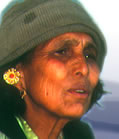 |
 |
||
 |
|||
|
RELATED THEMES economics education social relationships OTHER LOCAL THEMES BACKGROUND |
identity
Narrators are predominantly Brahmin or Chettri (Hindu) or Tamang (Buddhist), although there are also Magar, Majhi, Gurung, Sarki and Kami narrators. Although a narrator's ethnic group and caste is a factor in the way they describe themselves, identity also derives from religious affiliation, expressed particularly through major festivals in the Hindu or Buddhist calendar. People also describe ceremonies marking rites of passage such as marriage or death, although economic constraints have often trimmed down such celebrations and rituals. There is a tendency among some lower-caste narrators in the collection to put their own caste down and to complain, for example, about hard drinking, fighting, gambling, lack of unity, stupidity, or lack of ambition. Drinking is cited as inhibiting education among Magar adults, although one Magar (Nepal 5) concedes that the real reason for the failure among members of his caste to take education seriously may be because the medium of instruction is Nepali. He expresses the view that the Magar language is richer than Nepali and, like other groups with their own language, feel that the "mother-tongue" is essential part of identity. "If we want to develop the Magar language, we should not teach our children Nepali. We have to teach the Magar language first.. We have to teach learning and reading the language from the very beginning. For example, they are all Magar in Gulmi Bharsay hills. They don't know the Magar language, nobody speaks Magar but they are educated.they are rich too. But they do not speak the Magar language" (Nepal 5). A Brahmin schoolteacher says that the practice of sending girls to Bombay (where they earn money for their families as prostitutes) is most prevalent among Tamangs and Bishwakarmas. However, she does recognise the social and economic reasons that give rise to this, which she acknowledges are not so pressing among higher castes. It may be that the association of certain occupations with caste is also becoming less rigid. One man (Nepal 21) who runs a water mill says: "Everyone, not just Majhis, operates water mills. Now if they know how, just about anybody runs them. Even Bhotes, Danwars, Chettris and Bahuns operate them. In the old days, since Majhis lived near rivers it seemed as if it was the vocation of only the Majhis." Several higher caste narrators say confidently that caste prejudice and stigma has virtually died out, with the notable exception of Nepal 27, an honest, personal account by a Brahmin woman about caste relationships. And the testimonies of several lower caste narrators vividly illustrate just how powerful the forces of caste discrimination remain. One new and striking interview on the subject is Nepal 28, in which the narrator discusses government attempts to eradicate caste prejudice and relates from personal experience how her efforts to improve her situation through a savings group were destroyed by such discrimination. "The reason for opening the savings group is to co-exist, for all sisters (women) to be united. But this thinking did not come to the women... Even before joining the group, while going together to do farm work [upper caste women] gave us food separately, without touching us, and that really hurt my feelings. When [we] formed the group there was hope that such things would not happen but things have got worse." The group eventually broke up along caste lines. Another new Tamang narrator (Nepal 24) describes fierce tensions along caste lines in Kathmandu. She describes insults traded between Newar and Tamang, making it clear that city prejudice against "uncivilised" villagers is an additional element - and that she gives as good as she gets: "Whatever they said, we replied the same way. we also abuse." quotes about identity"[Our parents] did not get a chance to speak. They had to bow down while walking in front of others. They were not allowed by anyone to speak and make progress. If they tried to speak up, a person from the higher caste would say, 'Being a Kami (blacksmith) why do you have to speak? Keep quiet and sit. We [are the ones who] will speak,' they would say." "Now the government announces [the ban on untouchability] day and night. Now radio, TV, say that when the oppressed castes are discriminated against, they can straightaway go to the police to lodge a complaint without hesitation and that those involved will have to face punishment. [But] the thinking [of higher castes] is still the same. They don't like us speaking up and moving forward. They still have the tendency to suppress us." "[The Tamang] will drink without limit and finish all their money in one sitting. How they manage I don't know. After drinking they will fight and quarrel with people. Somebody gets hurt. Tamang always fight with each other after drinking. they tell their friends to drink also and they finish all the money they have earned from work. They spend their time playing cards, how will they make progress in their life? Tamangs drink too much, play cards and observe Ghewa [funeral rites]. That's why they become poor." "In all I feel it's not the 'ignorant' oppressed class but the Brahmins who have failed to understand. The Brahmin caste has to be counselled, I feel." "It has changed a lot. Before the inter-caste relation was not so good, people were not so friendly with each other, they didn't trust each other. But now, people have realised that we all should live in peace and harmony, they are now friendly and trust each other. Now they respect each other and respect the customs of other castes. In those days, people were selfish, they'd give importance to their own language only and they'd never go close to other's kitchen. It is not only not respecting, but actually they hated it. Like there are Magars who have their own language and culture which other people have started to respect now, but in those days the other people hated them." "Where have these savages, uncivilised lot come from?" [city] people say. When they are collecting water [the Newars] won't allow us to touch the dhara (stone water spout or tap) and if you go close to it they get really angry. They would not allow us there until they have filled all their water-jars. You have to either wait or else. And the quarrel begins. Most call us savages. [It is mostly] the Newars (major ethnic group)." |
|